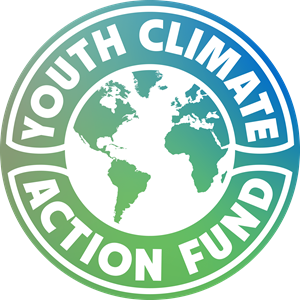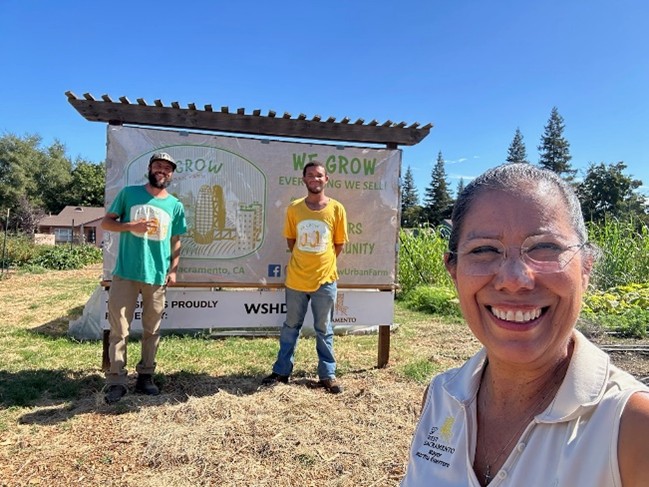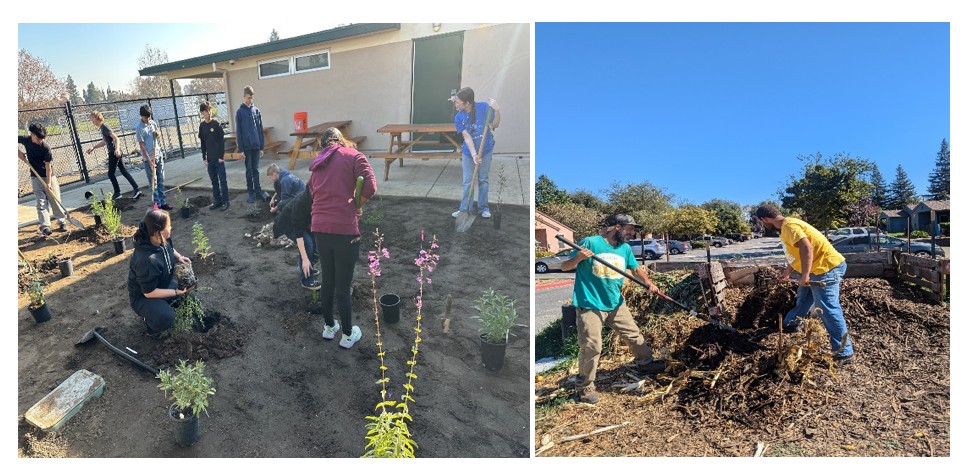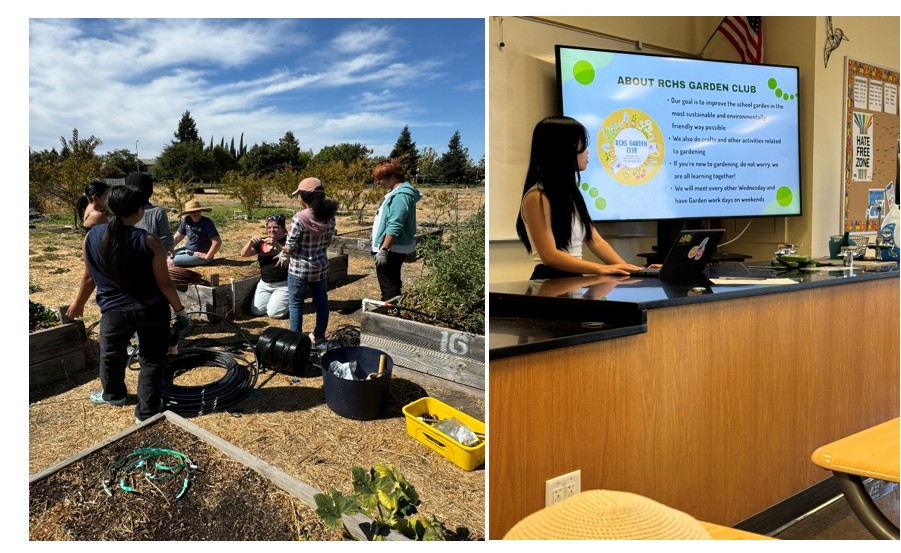
Calling all passionate environmental advocates!
Do you care deeply about the planet? Have big, bold ideas for tackling climate change but need the funding to bring them to life? Look no further!
We’re looking for driven, creative youth (ages 15-24) to lead impactful climate action projects in the City of West Sacramento and surrounding Yolo County. This is your chance to turn your vision into reality and make a real difference in your community!
Ready to take action? Join us and be the change!
Read More

The City of West Sacramento is excited to be selected for round two of the $100,000 grant from the Youth Climate Action Fund, supported by Bloomberg Philanthropies.
This exciting initiative can empower thousands of young people (ages 15-24) to take the lead in designing, implementing, and driving critical climate solutions in their communities.
By joining with cities from 38 countries across six continents, reaching over 62 million people, we are contributing to a global effort to address climate change. This is a critical time for advancing sustainability, and our actions matter.

Who can apply?
Any youth ages 15-24 can apply (applications are accepted and reviewed on a rolling basis). Your project should be in the $1,000-5,000 range and must be completed by October 31, 2025. Your project must be new and the microgrant may only be used for projects that are youth-led (adults can serve as an advisor) or managed by organizations which are either youth-led or have a strong focus on youth. Proposed projects in West Sacramento will have priority, all projects must be in the Yolo County region.
What types of projects can be supported by the Youth Climate Action Fund?
The Youth Climate Action Fund is designed to tap into the insight, creativity, and passion of young leaders, empowering them to take meaningful action on climate change. This initiative supports a wide range of projects, providing microgrants to youth-led and youth-serving organizations.
Funding can support a variety of initiatives, including awareness campaigns, educational programs, research projects, collaborative efforts, climate mitigation and adaptation strategies, involvement in local climate action governance, and art projects.
Eligible microgrant project expenses include:
- Project supplies and materials, including rental and purchase of items directly needed to carry out the project, such as equipment, tools, art supplies, or technology.
- Costs for organizing community events, workshops, or educational sessions, including venue rental, printing of materials for participants, and basic refreshments.
- Costs for any necessary permits to implement the project in accordance with local regulations.
- Reasonable ground travel expenses for youth participants or team members directly involved in project implementation.
- Promotional materials to raise awareness about the project, encourage engagement from stakeholders and the greater community, and share project results including photography, editorial support, and videography.
- Reasonable fees for training and mentorship are offered in workshops with youth participants.
- Project sponsorship costs that local non-government organizations (NGOs), civic groups, neighborhood clubs, schools or other organizations may charge for receiving a microgrant on behalf of youth project leaders. The costs should be no more than 15% of the microgrant value.
- Microgrants are not intended as stipends or salary for the youth leads but rather encourage volunteerism and civic engagement. Therefore, the following expenses are permitted, but they should not make up the majority of the microgrant: funds to enable youth participation such as bus fare, per diems for food or gift cards.
Examples may include but are not limited to: Awareness, Education, Research, Co-Development Initiatives
- Youth Climate Advisory Boards: Establish advisory boards composed of young people to work alongside city officials in designing and refining climate policies and programs, ensuring that they reflect the needs and perspectives of youth.
- Youth-Led Climate Education Programs: Develop educational initiatives led by young people that target local schools and communities to increase awareness and understanding of climate issues.
- Youth Climate Hackathons: Organize hackathons where young tech-savvy individuals can create innovative solutions and apps to address climate challenges in the city.
- Youth-Led Climate Surveys and Research: Engage youth in conducting surveys and research on local climate impacts, helping to gather valuable data for decision-making.
- Youth-Designed Public Art and Awareness Campaigns: Encourage young artists to create public art installations and awareness campaigns that convey the urgency of climate action and the city’s goals.
Launching Climate Improvement and Adaptation Initiatives
- Community Gardens, Tree Plantings, and Urban Farming: Support youth-led initiatives to create community gardens, green rooftops, and urban farming projects to promote sustainable food production and reduce carbon emissions.
- Youth-Managed Recycling and Waste Reduction Programs: Empower young people to lead efforts in recycling, waste reduction, and upcycling programs, making communities more environmentally friendly.
- Green Transportation Initiatives / Designing Streets with Kids: Encourage youth to propose and implement bicycle-sharing programs, pedestrian-friendly initiatives, and electric vehicle charging stations to reduce reliance on fossil fuels.
- Youth-Led Reforestation and Tree-Planting Campaigns: Mobilize young volunteers to plant trees, improve urban green spaces, and increase urban canopy coverage for better air quality and climate resilience.
- Climate Resilience Workshops and Disaster Preparedness: Youth groups can organize workshops and training sessions on disaster preparedness, climate resilience, and community-based responses to extreme weather events.
Involvement in Governance of Local Climate Action Plans
- Youth Climate Participatory Budgeting: Establish dedicated resources for young residents to allocate annually toward climate priorities set by cities for programs created by youth.
- Youth Climate Ambassadors: Designate youth climate ambassadors to represent young people’s perspectives in city council meetings*, climate task forces, and public consultations.
- Youth-Hosted Climate Town Halls: Organize town hall meetings moderated by youth leaders where community members can discuss climate-related concerns and ideas for solutions.
- Youth Climate Data Monitoring: Develop apps or youth citizen science platforms for tracking and reporting on local climate data, helping authorities make informed decisions and involving young people in data-driven governance.
Youth-Created Climate Action Plans: Encourage youth teams to develop their own climate action plans for their communities, which can be integrated into the city’s broader strategy.
* Grant funds must not be used to conduct legislative advocacy nor lobbying.

Eligible Groups and Organizations can apply:
- Grantees must possess bank accounts registered under the organization’s name, not under an individual’s name.
- The organizations can be either youth-led or youth-serving organizations. A youth-serving organization is generally led by adults and provides programs and resources intentionally designed to meet the needs of young people.
- Other types of organizations can administer and manage the funds and serve as sponsors for youth-led projects.
-
- These can include:
-
-
- a city agency or department (such as a library, museum, school, parks and recreation department, or other educational institutions), a community organization, a religious organization, or other recognized organizations or associations that can serve as fiscal agents to support project expenses.
- This arrangement can work, for instance, in cases where youth groups, classroom initiatives, or school clubs choose to submit projects and wish to manage funds through their affiliated schools.
-
- Youth-led projects need to be composed of at least three individuals aged 15 to 24 who actively participate in decision-making and oversight.
- The city unit that is housing the city’s Youth Climate Action Fund program and evaluating microgrant applications is not eligible as a sponsor of any microgrant applications to ensure transparency and avoid conflicts of interest
What type of expenses are not covered by the Youth Climate Action Fund?
The microgrants cannot be used to fund services covered by existing city initiatives or round 1 micro grant projects, rent or utilities, nonprofit/NGO incorporation fees, speaker honorariums, improvement projects primarily serving religious organizations, scholarships, direct support to individuals or families, partisan political organizations, political candidates, fundraisers, non-youth led projects, capital campaigns, endowments, or endowed chairs, adult-advisor stipends, and events or fundraisers not related to youth climate action.
Click on the link below for the Youth Action Climate Fund Application.
SacBreathe will host informational webinars. Please register below:
- March 28th: 12 pm – https://tinyurl.com/4s6wsjph
- April 4th: 4 pm – https://tinyurl.com/2c577fru
- April 11th: 12 pm – https://tinyurl.com/4z6rcwdf
- April 18th: 4 pm – https://tinyurl.com/42jtdvf6
Please feel free to reach out to Kassandra- kvega@sacbreathe.org
